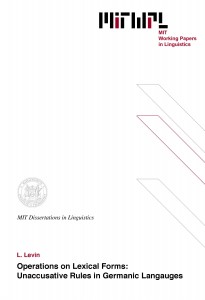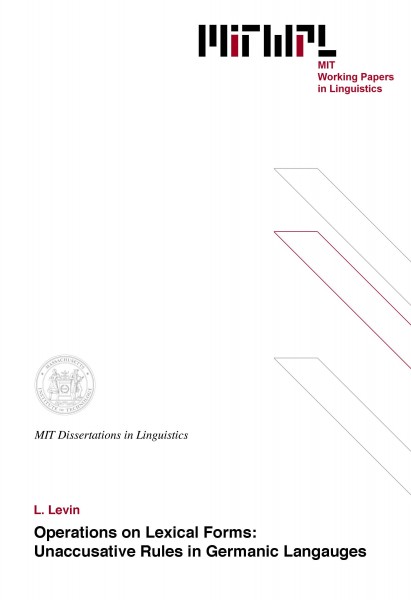Operations on Lexical Forms: Unaccusative Rules in Germanic Languages
L. Levin, 1986
Copyright
Copyright © 1986 by MIT working papers in linguistics
Tags
Type: #dissertation
Subfield: #syntax #semantics #lexical_semantics
Languages: #Germanic
Topics: #argument_structure #unaccusatives
Description
"This thesis describes a theory of relation changing rules in LFG, concentrating on rules which distinguish between unaccusative and unergative verbs. I call these rules Unaccusative Rules (URs). In order to handle URs I introduce a new mechanism which I call Argument Classification (AC) which mediates between thematic roles and grammatical functions. AC puts thematic arguments into one of four argument classes: unexpressed, semantically restricted, subjective unrestricted, and general unrestricted. Then, grammatical functions are assigned to these classified arguments instead of being assigned to unprocessed thematic argument slots. The theory of relation changing rules specifies allowable argument classifications and allowable assignments of functions to classified arguments. In order to illustrate the theory, I formulate a number of rules in English and Dutch.
Chapter 1 provides background information about grammatical relations and relation changing rules in LFG. Chapter 2 summarizes properties of relation changing rules which a theory should account for: semantic conditioning, syntactic productivity, ability to distinguish between subjects of unaccusative verbs and subjects of unergative vebrs, and apparent directionality of subject-to-object relation changes. Chapter 3 describes a new theory of relation changing rules based on the notion of argument classification and the distinction between semantically restricted and semantically unrestricted grammatical functions. Chapter 4 applies the theory to several constructions in English and raises three additional issues: the status of Burzio"s Generalization, the treatment of double object verbs, and the treatment of oblique subjects and dummy subjects. The theory yeilds particularly good insights on the latter two points. Chapter 5 illustrates the theory further using three Dutch URs. This chapter continues the discussion of non-nominative subjects and also discusses the problem of rule mismatches. Rule mismatches arise when a given predicate acts as if it were unaccusative in one construction and acts as if it were unergative in another. I discuss possible resolutions of the mismatches and their implications for the status of AC as a level of representation."
The committee
- Thesis supervisor
- Joan Bresnan, Professor of Linguistics at Stanford University
- Thesis supervisor at MIT
- Kenneth Hale, Ferrari P. Ward Professor of Linguistics

